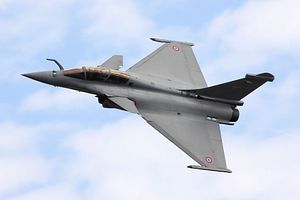The government-to-government arrangement between India and France for the sale of 36 Dassault Rafale fighters to New Delhi may be running into insurmountable problems. Over at the Business Standard, Ajai Shukla reports that Paris is publicly acknowledging the possibility that the deal may collapse entirely over persistent differences between the two countries over pricing issues and India’s “insistence on enforceable guarantees regarding the fighter’s delivery, performance, and availability.”
Shukla’s report contains some remarkably frank quotes from the French side in these negotiations. A senior French official told the Business Standard that if the Indian defense ministry continues to drive a hard negotiation, France could look elsewhere: “We are currently building it for Egypt and Qatar, and we could have another customer in Malaysia,” he remarked, highlighting other deals. The same official went on with a particularly biting taunt for Indian defense officials: “If you don’t want the Rafale, go ahead and build the F-16 here. You can build it in India and supply it to Pakistan also.” He was referencing a recent $699 million U.S.-Pakistan deal for the sale of eight F-16 Block-52 fighters.
The French official’s remarks sought to make it clear that France holds the stronger cards in the negotiations and doesn’t necessarily need to sell India 36 fighters to ensure that the Rafale project breaks even for Dassault. “The Rafale project is commercially viable based on the numbers that the French military requires, even if there is not a single export order,” he added.
As I reported for The Diplomat last year, India put an end to its long-troubled Medium Multi-Role Combat Aircraft (MMRCA) tender, which sought 126 jets. Dassault’s Rafale had won the tender after a competitive evaluation of several international firms and their offerings, including the Boeing F/A-18E/F Super Hornet, Lockheed Martin F-16, Mikoyan MiG-35, Saab Gripen, and the Eurofighter Typhoon. Instead, in what initially appeared to be a simplification of the procurement process, India decided to deal directly with the French government in a deal that was announced unexpectedly during Indian Prime Minister Narendra Modi’s April 2015 visit to France.
Now, nearly a year later, the two countries remain hung up on a range of issues. For example, as my colleague Franz-Stefan Gady discussed in January, the two governments were hung up for months on so-called “offset clauses” in the deal, which require Dassault to invest 50 percent of the contract value of the deal inside of India. Though India is keen to conclude the deal to fill important requirements for the Indian Air Force, it is also interested in bringing investment to the country and having the deal spur a more robust domestic defense industrial base, in line with Modi’s “Make in India” initiative.
Shukla’s report highlights the extent to which France is growing frustrated with India’s negotiating position on the Rafale deal. That an official would take to the Indian press to taunt and criticize New Delhi’s position speaks to the fact that this deal is increasing heading onto thin ice and risks falling through entirely. In recent weeks, New Delhi’s negotiating position has only hardened; for instance, in February, it requested a further decrease in the price after initial concessions by France. India’s decision to have French President Francois Hollande visit in January as the chief guest for its Republic Day parade did not seem to make any appreciable difference on the status of the negotiations.
The favorable cost differential was one of the factors that initial drove India to scrap the MMRCA and opt for a government-to-government arrangement with the French. The 36 fighters in this deal are to be purchased in “fly-away” condition, meaning that the complications of arranging for domestic assembly by Hindustan Aeronautics Limited (HAL) no longer applied. Nevertheless, despite initial optimism that the new deal would see the IAF fly some Rafales–if not the full 126 it sought under the MMRCA–a deal may still be months away.































